HIPAA Compliance in Telemedicine App Development: Best Practices and Guidelines
The Health Insurance Portability and Accountability Act, abbreviated as HIPAA, is a federal law established in 1996 in the United States. Regarding HIPAA compliance, it involves the adherence of healthcare providers, health plans, and business associates to the standards outlined. Furthermore, this act establishes national guidelines to safeguard the confidentiality, integrity, and accessibility of individuals’ health information (PHI) in telemedicine software development.
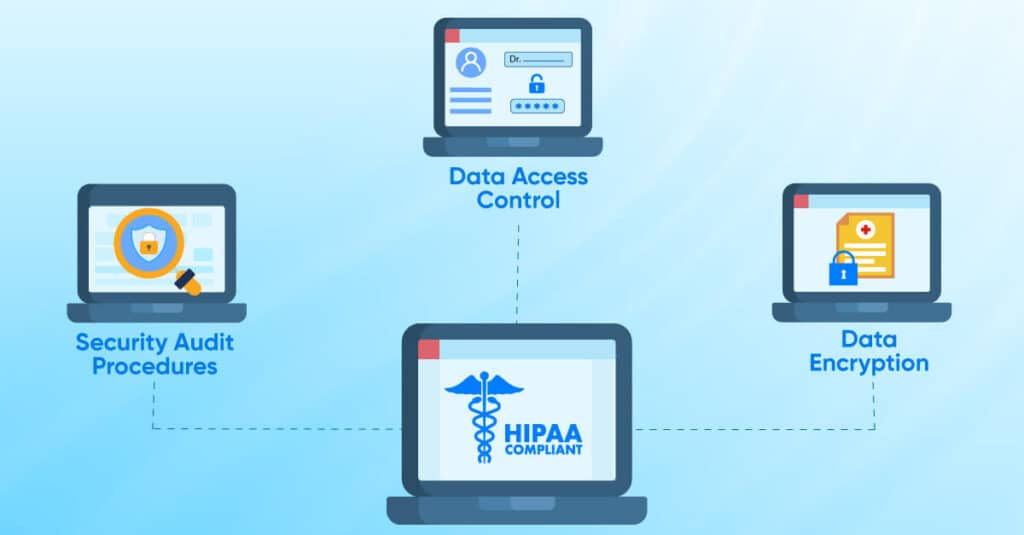
To achieve HIPAA compliance, organizations must implement various safeguards. Firstly, physical safeguards encompass facility access controls, workstation security, and device and media controls. Moving on to the technical aspect, safeguards involve using access controls, audit controls, and encryption to protect PHI.
Additionally, administrative safeguards involve policies, procedures, and training to ensure staff members understand and comply with HIPAA regulations. It’s essential to note that HIPAA compliance covers all types of PHI, including paper, electronic, and oral information. Covered entities and business associates must guarantee that authorized persons only access PHI, and any disclosures should follow HIPAA regulations.
The consequences of noncompliance with HIPAA regulations can be severe. Violations may lead to significant fines, loss of reputation, and legal action. Therefore, healthcare organizations must take HIPAA compliance seriously and implement appropriate safeguards to protect PHI.
HIPAA compliance involves a below range of actions and policies
1. In place administrative, physical, and technical safeguards to safeguard PHI.
2. Protecting the privacy, accuracy, and accessibility of protected health information (PHI).
3. Providing HIPAA regulations and policies training to employees.
4. Creating and executing policies and procedures for the management of PHI.
5. Performing evaluations of potential risks and executing risk management plans.
6. Notifying impacted individuals, the Department of Health and Human Services, and potentially, the media about incidents of PHI breaches.
7. Assigning a HIPAA compliance officer or privacy officer to supervise and manage compliance initiatives.
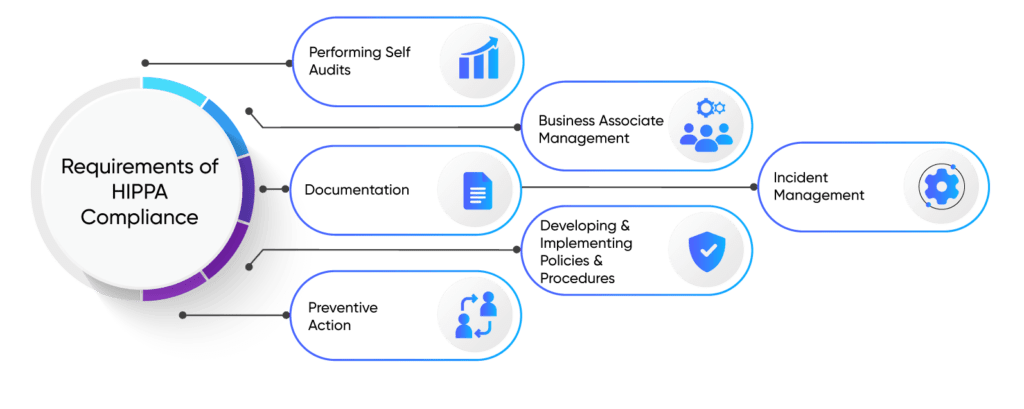
What is Protected Health Information (PHI)?
Protected Health Information (PHI) is any information about an individual’s health status or healthcare services that is personally identifiable. A federal law regulating how healthcare providers, insurance companies, and other healthcare-related organizations handle patients’ sensitive information.
The following are some examples of PHI:
1. Patient name, address, and phone number
2. Medical diagnosis or condition
3. Dates of service
4. Social security Number
5. Healthcare provider’s name and address
6. Medical test results
7. Repetitive Test Cases :
8. Insurance information, such as policy numbers and coverage details
9. Any information that could be used to identify an individual’s medical history
It is essential to protect PHI to maintain patient confidentiality and privacy. Healthcare providers must obtain written consent from their patients before sharing any PHI with other healthcare providers or organizations. Patients also hold the right to access their PHI and can request amendments if corrections are necessary.
As HIPAA requires, healthcare providers and organizations must implement specific safeguards to protect PHI from unauthorized access, use, or disclosure. Moreover, these safeguards encompass administrative, physical, and technical measures to ensure PHI’s confidentiality, integrity, and availability.
Why is it Important to Develop HIPAA-Compliant Telemedicine Applications?
Nowadays, digitalization is transforming everything, and the chances of personal data leakages are increasing. The healthcare provider must ensure the protection of the patient’s information. During a pandemic, telemedicine has revolutionized the way healthcare is delivered.
It allows patients to receive medical care remotely from their homes or other locations. It is making accessing healthcare services more accessible and more convenient. However, as telemedicine gains popularity. The healthcare industry increasingly needs to ensure they keep the patient’s personal health information (PHI) secure and confidential.
HIPAA-compliant telehealth aims to maintain the utmost confidentiality and security of patient information through the involvement of healthcare professionals. HIPAA applies to all healthcare providers, including those who provide telemedicine services. Therefore, developing HIPAA-compliant telemedicine applications is essential to maintain PHI’s privacy and security.
Here are some reasons why it is essential to develop HIPAA-compliant telemedicine applications:
Protects Patient Privacy
Patient health data contains sensitive information, and breaking privacy is dangerous. HIPAA regulations protect patients’ PHI from unauthorized access, use, and disclosure. Telemedicine software that complies with HIPAA regulations. It will have measures to safeguard patient information, such as secure logins, encrypted communication channels, and strict access controls. This helps maintain patient privacy and confidentiality, a fundamental aspect of healthcare.
Avoids Legal and Financial Penalties
HIPAA violations can result in severe legal and financial consequences for healthcare providers. Moreover, the penalties for noncompliance can range from thousands to millions of dollars, depending on the severity of the violation. Therefore, developing a HIPAA-compliant telemedicine application can help healthcare providers to avoid these penalties by complying with all relevant regulations and standards.
Increases Patient Trust
By developing a HIPAA-compliant telemedicine application, healthcare providers can build patient trust. This is achieved by adequately managing Protected Health Information (PHI) and respecting patient privacy. Moreover, demonstrating the safety of patients’ PHI and upholding their privacy exemplifies a commitment to HIPAA compliance. As a result, healthcare providers play a vital role in making patients feel more confident and comfortable when utilizing telemedicine services.
Enhances Security
HIPAA compliance requires healthcare providers to implement specific security measures to protect PHI from cyber threats. Telemedicine applications that comply with HIPAA regulations. It will have the necessary security measures, such as firewalls, antivirus software, and regular vulnerability assessments. These measures help to ensure that patient information is safe and secure and reduces the risk of data breaches.
How To Develop HIPAA Compliant Telemedicine App
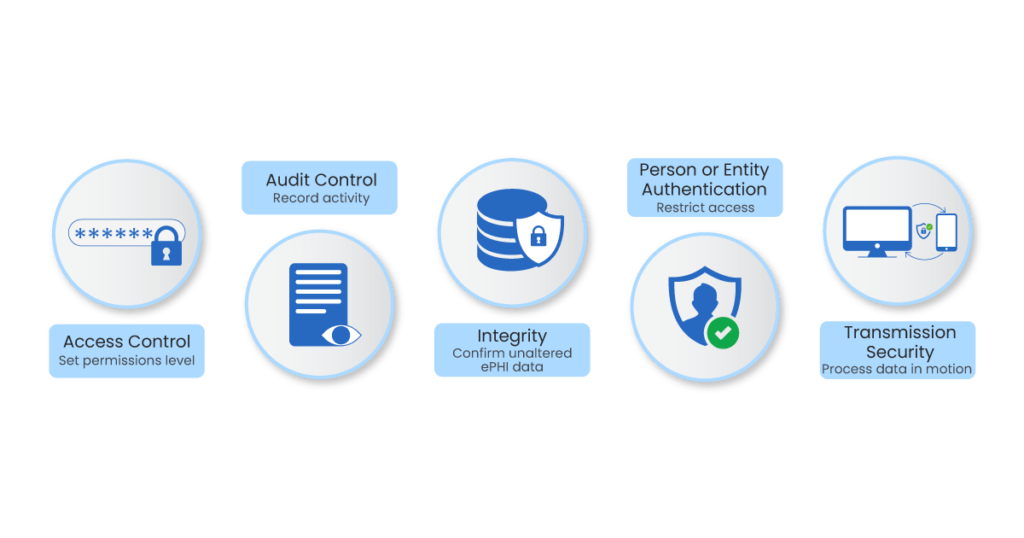
As telemedicine involves exchanging sensitive patient information, it is essential to ensure it is HIPAA compliant. Let us discuss how to develop a HIPAA-compliant telemedicine app.
Ensure Secure Data Transmission
Secure data transmission is one of the most critical aspects of a HIPAA-compliant telemedicine app. All patient and healthcare provider communication should be encrypted to protect patient data. You can achieve this by implementing secure communication protocols such as SSL/TLS, HTTPS, and VPNs. Additionally, the app should use robust authentication mechanisms to verify the identity of the users.
Design Access Controls
To comply with HIPAA regulations, unauthorized persons must restrict access to patient data. Consequently, the app should implement access controls to ensure only authorized users can access patient data. This implementation can achieve by incorporating a role-based access control module, which limits access to patient data based on user roles. As a result, the app conceals sensitive patient data from unauthorized individuals.
Ensure Data Encryption
In addition to secure data transmission, the app should encrypt patient data at rest. All patient data should be encrypted when stored on the app’s servers or any other storage medium. You can achieve this using encryption technologies such as Advanced Encryption Standard (AES) or Triple Data Encryption Standard (3DES). You can safeguard patient data and maintain HIPAA compliance for telemedicine applications by ensuring data encryption.
Implement Data Backup and Recovery Mechanisms
HIPAA regulations require that all patient data be backed up and recoverable in case of data loss or system failure. The app should have data backup and recovery mechanisms to prevent losing patient data. You can achieve this by regularly implementing automated backup mechanisms and testing data recovery procedures.
Conduct Regular Security Audits
Conduct regular security audits to ensure the app is HIPAA compliant. It will help you identify vulnerabilities and weaknesses in the app’s security and address them before they get exploited. You can conduct security audits using automated tools.
What are HIPAA compliance Rules?
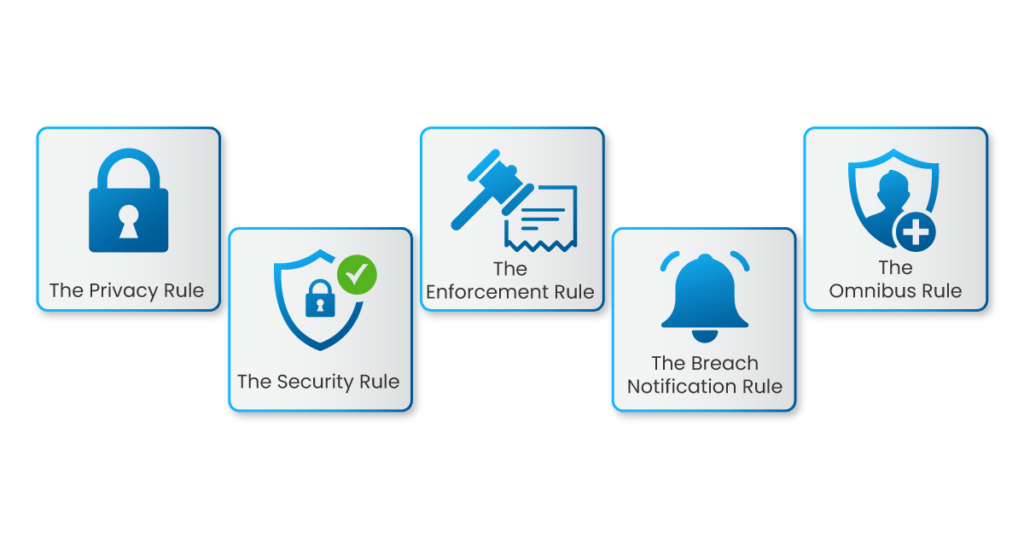
The HIPAA Act consists of the following:
- Privacy Rule
The Privacy Rule sets national standards for protecting individuals’ health information. Providers must ask patients for permission before accessing and sharing their information. They must also ask permission to modify or update the information or to make a copy. Patients can either grant or deny this permission. This includes getting written consent from individuals before using or disclosing their health information. Privacy rules include patients’ access to their PHI and Healthcare providers’ rights to deny access to PHI.
- Security Rule
The HIPAA Security Rule establishes national standards for the secure transmission, maintenance, and handling of ePHI. Moreover, it mandates that covered entities implement administrative, physical, and technical safeguards. Consequently, these safeguards play a crucial role in safeguarding the confidentiality, integrity, and availability of ePHI.
- Breach Notification Rule
The Breach Notification Rule mandates that specific organizations alert those impacted by unsecured Protected Health Information (PHI) breaches. Moreover, they must inform individuals, the Department of Health and Human Services (HHS), and sometimes the media.
- Omnibus Rule
The Omnibus Rule was enacted in 2013. It strengthened several aspects of HIPAA, such as expanding the definition of “business associate” to include subcontractors. It also increased penalties for noncompliance and required business associates to comply with the HIPAA Privacy and Security Rules.
What are Common HIPAA Violations?
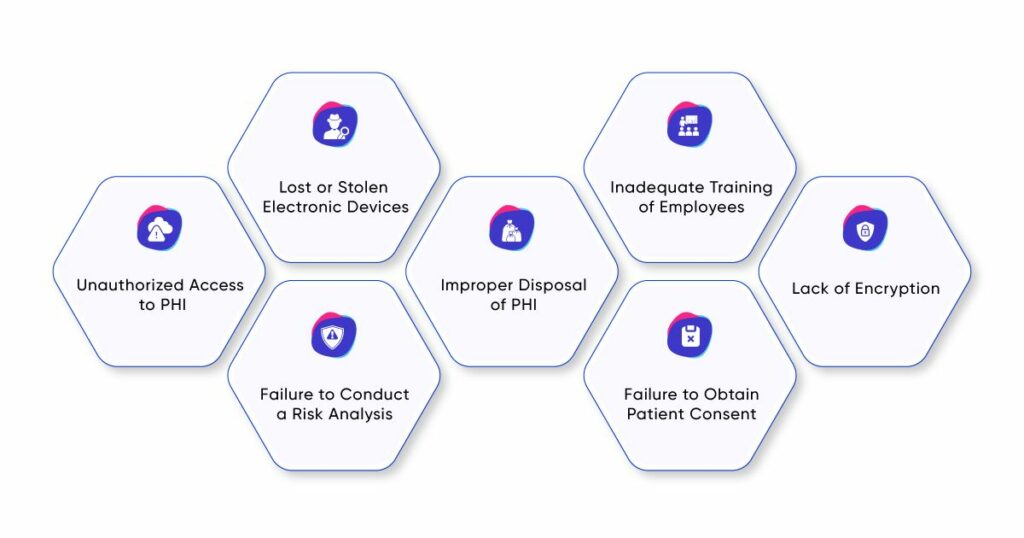
HIPAA, the Health Insurance Portability and Accountability Act, is a federal law regulating how healthcare providers handle patients’ private health information. The law establishes standards to ensure the confidentiality, integrity, and availability of protected health information (PHI).
Unfortunately, despite HIPAA’s strict regulations, violations still occur frequently. Here are some of the most common HIPAA violations:
1. Unauthorized Access to PHI : This violation occurs when someone not authorized to view a patient’s PHI gains access. This can happen when an employee views the medical records of a friend or family member without a valid reason.
2. Lost or stolen Electronic Devices : When healthcare providers store PHI on electronic devices such as laptops or smartphones, they must take steps to secure the information. If a device containing PHI is lost or stolen, it can result in a HIPAA violation.
3. Failure to Conduct a Risk Analysis : HIPAA requires healthcare providers to conduct a risk analysis to identify potential threats to PHI. If an organization fails to do so, it can be cited for a HIPAA violation.
4. Improper Disposal of PHI : Healthcare providers must securely dispose of PHI to prevent unauthorized access. If PHI is improperly disposed of, such as by throwing it in the trash or leaving it in a public area, it can result in a HIPAA violation.
5. Inadequate Training of Employees : HIPAA requires healthcare providers to obtain patient consent before sharing their PHI with third parties. A provider sharing PHI without obtaining proper consent can violate HIPAA.
6. Failure to Obtain Patient Consent : HIPAA requires healthcare providers to obtain patient consent before sharing their PHI with third parties. A provider sharing PHI without obtaining proper consent can violate HIPAA.
7. Lack of Encryption : Healthcare providers must encrypt PHI when transmitted electronically to prevent unauthorized access. If PHI is transmitted without encryption, it can violate HIPAA.
Why Choose Thinkitive for HIPAA Compliance Telemedicine App Development
Suppose you plan to develop a Telemedicine app that complies with the Health Insurance Portability and Accountability Act (HIPAA). In that case, you must partner with a company with expertise and experience. They will guide you through the complex regulations and requirements. And that’s where Thinkitive comes in.
Here are some reasons why you should choose Thinkitive for HIPAA-compliant Telemedicine app development:
Expertise in Healthcare Software Development
Thinkitive has extensive experience developing healthcare software solutions, including Telemedicine app development. Our team has a deep understanding of the healthcare industry and the regulatory requirements that govern it.
Understanding of HIPAA Regulations
HIPAA regulations are complex and constantly evolving. However, at Thinkitive, we have a team of experts who keep up-to-date with the latest developments and changes in HIPAA regulations. With their help, we can guide you through the HIPAA compliance requirements to ensure your Telemedicine app is secure and compliant.
Customized Solutions
At Thinkitive, we understand that healthcare providers have unique needs and requirements. As a result, we offer customized solutions tailored to your specific needs. Moreover, we work closely with you to understand your business requirements, develop a strategy, and execute a plan that meets your goals.
Robust Security Measures
Security is a top priority regarding healthcare data. Moreover, Thinkitive has stringent security measures to protect your data from unauthorized access, breaches, and cyber threats. Additionally, we implement best practices in encryption, access control, and data backup to ensure your data is safe and secure.
Cost-Effective Solutions
Developing a Telemedicine app can be expensive, but with Thinkitive, you can save costs without compromising quality. We offer cost-effective solutions that are designed to meet your budget and timelines.
Conclusion
HIPAA is an essential legal field. It has been crucial in protecting confidential health information. It is expected to remain a vital part of healthcare in the future. We have developed more than 50+ apps that are HIPAA compliant. We are expertise in developing HIPAA compliance software. With the adoption of Telemedicine HIPAA compliance measures, sharing data on such platforms has become significantly more straightforward and more secure.



